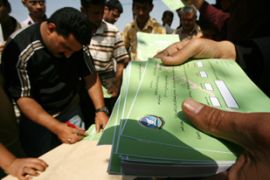Sadrists close ‘ballot’ for Iraq PM
Results of unofficial plebiscite by election kingmaker due “in the next few days”.

Final results in Iraq’s March 7 elections gave the Iraqiya coalition led by Iyad Allawi, a former prime minister, just two seats more than State of Law bloc led by Nouri al-Maliki, the incumbent prime minister.
Preferred PM
The Sadrists’ ballot for chosing a prime minister listed both al-Maliki and Allawi, alongside al-Maliki’s predecessor Ibrahim al-Jaafari, Adel Abdel Mahdi, a vice-president, and Jaafar al-Sadr, who ran on al-Maliki’s list but has al-Sadr family ties.
|
Ballot sheets also included space for voters to write the name of other nominees they might prefer.
The Sadrists won at least 39 seats in the 325-seat parliament making them the largest group within the Iraqi National Alliance (INA), a Shia coalition that placed third in the race.
Although the ballot was nominally open to all Iraqis, the vast majority of voters are likely to have been Sadrist backers.
Sadrist officials were seen carrying ballot boxes around Baghdad, stopping people on the street and arriving on locals’ doorsteps to ask them to vote.
Voters were not required to present identification when casting ballots, and no official observers oversaw the poll, with little to stop people from voting many times.
‘Shrewd move’
The referendum is widely seen as a way for the Sadrist bloc, whose 30-something leader has been in Iran for about two years, to avoid giving its backing to al-Maliki.
“With this referendum, the Sadrists have made a shrewd move to put pressure on the other political parties,” Hamid Fadhel, a Baghdad University political science professor, said.
“The negotiations with State of Law have stalled and the Sadrists want to push for someone other than Nouri al-Maliki [as premier], armed with popular support.
The Sadrists were key supporters when al-Maliki formed his government in 2006.
But two years later, he turned the security forces on the Mahdi Army, the movement’s armed wing, jailing thousands of al-Sadr supporters in a campaign to destroy militias in the southern city of Basra and the Baghdad suburb of Sadr City.
Meanwhile, Allawi received a major boost to his hopes of becoming prime minister after the leader of a key faction within the INA said it would not join a government without him.
“We will not participate in a government that does not include Iraqiya,” Ammar al-Hakim of the Supreme Iraqi Islamic Council said.
“It received many votes in the western regions and in Baghdad, and it is not right to ignore the will of these people, because excluding Iraqiya means excluding these people.”
